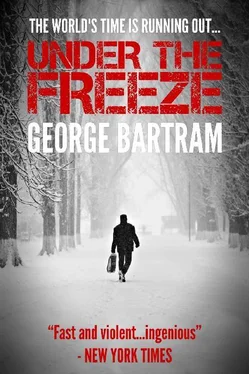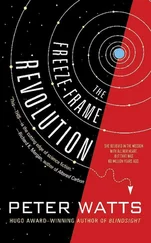“You could have set up a network in Cuba and Central America,” Tarp said after half an hour of wrangling. The old man was getting weak by then.
“So?”
“Maxudov set up a network in those places.”
“Maxudov isn’t me.”
“He could be.”
The eyes merely stared at him as if the face were too weary to show expression,
“Who do you think it is, then?” Tarp pleaded.
A long silence. Then, with a malice that pierced through the weariness, Telyegin said, “Comrade Andropov?”
“It is not Andropov.”
“You mean, even if it is Andropov, it is not Andropov.” He made the ghastly noise that was laughter again. “What has a Cuban network to do with anything?”
“Maxudov tried to kill me in Cuba.”
“Good for him.” The clothes stirred. “I know who Maxudov is,” he whispered.
“ Who ?”
“He is a character in a book. Did you know that?” The eyes were malicious and gleeful when they saw that Tarp did not know. “Not too bright, are you? Uncultured, yes. Maxudov is a character in a novel. Nobody reads it. It’s a piece of shit. Of course nobody reads it in America — no money in it.” He wanted to laugh, but the words had taken his energy. He sat there, gathering his strength, his breath wheezing over the hum of the electric heaters. “In the Theatrical Novel of Bulgakov. The character of Maxudov. That is who Maxudov is.”
Tarp felt that he had been checkmated. “I am not interested in novels,” he said lamely.
“There is also a character named Strisz in the novel. You find that interesting?”
“Do you think that Strisz is Maxudov?”
“I don’t know. I don’t care.” He closed his eyes. He looked like the corpse of a king. “Sixty-four years of service, a devoted Chekist, a full colonel, and I wind up being asked stupid questions by an American. If I had the strength, I’d puke.”
Tarp got to his feet. He tried to say something human, even something as simple as “Thank you” or “Good-bye,” but the old man’s fury was palpable, and he refused any gesture. Before Tarp got out of the room, however, he heard a sound, and he turned to see Telyegin’s eyes open and glaring at him. He had been husbanding his energy for a last statement, and it came in a voice that must have been the voice men had heard in his good days, powerful and deep. “I hope you die this way,” he said. “I hope they all die this way.”
Tarp got into the back of the car without knowing what he was doing. He was shaken by that rage and that curse. He could not answer when the guards spoke to him.
* * *
“I am not Maxudov. Do you think I really could be Maxudov? Do you think I could really be stupid enough to use a name from a book in which my real name appears? I do not know this novel; I’m not a great reader, especially of fiction, which usually bores me, but… do you think I would be so stupid?”
Strisz was in his fifties and prosperous-looking. Andropov had called him “too social,” and indeed there was something both amiable and sociable in his wide face, as if he were eager to entertain. He looked well fed, more Scandinavian or Dutch than Russian, without the high cheekbones that made many Russians’ eyes look small.
“Some men would pick such a name because they would think themselves clever, because nobody would believe they would be so stupid. Some men would take the risk to enjoy a secret feeling of being smarter than their enemies,” Tarp answered.
“Oh, people would believe that I could do a stupid thing! I have a record of doing stupid things. You’ve seen my file.” He laughed. He seemed absurdly relaxed for such a situation. He seemed guileless, and Tarp believed that no one was guileless.
“If you are not Maxudov, why do you think somebody has used that name?”
“It’s rather witty, isn’t it? A character from a Russian novel, and none of the Russians who are tearing around worrying about it recognizes the name. That’s rather witty.”
“It’s a fairly obscure novel.”
“Have you read it?”
“I glanced through it. Maxudov is the narrator — a stand-in for the author, Bulgakov. He was under KGB surveillance at the time.”
“You see? That’s witty.”
“You believe in taking a psychological approach to Maxudov?”
“Well, psychology is often more productive than beatings, which is what some of my colleagues prefer. Naming no names, of course.” He opened a drawer in the desk behind which he sat. It was not his desk, but he seemed curious about what was in it. They were in an office of an annex of the municipal offices — a space borrowed for the purpose by Strisz and as anonymous, for him, as the dacha where Tarp had met Telyegin.
“Do you know Russia?” Strisz was saying.
“Does anybody know Russia?”
Strisz laughed and made a face. His face was very lively, always showing emotional play. Tarp had to resist liking him, and he guessed that Strisz knew the effect he was having. He was a man whom it was easy to like, and it may have been for that, too, that Andropov had seemed to distrust him.
“I mean, do you know us well enough to figure us out?”
“I don’t know.”
“It’s a little thick, you know, bringing in a capitalist to find a Soviet traitor. I suggested a Chinese, but that was taken as a joke.” He made another face. “Far too much of what I say is taken as a joke.”
“You have had only two foreign postings, is that right?” Tarp said severely. Strisz would recognize the tone — that of the serious man returning to business, rejecting amiability.
Strisz sighed. “Only two, yes. Bulgaria and Hungary. As you must know already.”
“You have never been to Cuba? To Argentina? To England?” Strisz shook his head right through all the questions. It amused him to do so.
“You were passed over for promotion last year.”
“I remember.”
“Three years ago you asked for a transfer.”
“And was refused, yes.”
“Why the transfer?”
“Because I am an ambitious man.” He raised his eyebrows as if to say, Surprise, surprise! “I asked to be switched to satellite communications training for one year and then to be given a suitable post in the Eighth Directorate. Am I saying too much?” He pretended to be worried. “Am I violating security, telling you this?”
“The Eighth Directorate is satellite and electronic communications. I believe that’s already known in Washington.”
“A Soviet citizen can be arrested for discussing these things with a foreigner. Are you really a foreigner? How do I know you’re not a Ukrainian in disguise? Ukrainians are the very devil for disguises. I may be one, in fact — this may be a false face I’m wearing.”
“Why did you want the transfer?”
“Because my post in the First Chief Directorate is a beautiful dead end. Do you think the future of communism lies in the reports of agents planted in the Warsaw Pact countries and Cuba? I doubt it — really, I doubt it. Satellite communications, on the other hand — there, an ambitious man could have a good time.” For a moment his face was open, as if he were asking Tarp to understand him as a man. It could have been part of his act. “I’m still young as these things go — the Soviet Union is a country of young workers and old leaders, as you may have noticed. Twenty years as head of the Eleventh Department doesn’t much excite me; twenty years scrambling to the head of First Chief Directorate does.”
“You would have to take an inferior post.”
“I have faith in my own abilities.”
“That sounds like something that Maxudov might say.”
“Now who’s indulging in psychology?”
Strisz was a good subject for interrogations. He was, as Andropov had said, intelligent, but he was also strong-willed. “Look here,” Tarp said, trying to sound hard but not unfriendly. “The man I want set up a clandestine network in Cuba, I’m sure of it. That took time and it took inside knowledge. You’re the ideal man for that. You have the opportunity, the contacts — I’m sure you have rewards you can hand out — you know the KGB presence there because you’re in charge of it. All right-on that basis, you are Maxudov.” He held up his hand as Strisz got ready to say something. “However, I’m also looking for a man who seems to have set up something much cruder in London.”
Читать дальше












